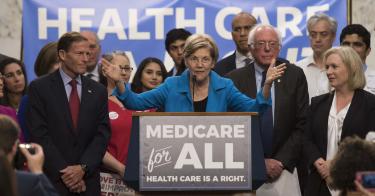The same misleading promises that surfaced repeatedly during the debate over the Affordable Care Act are being heard once again: lots more government involvement in your health care will save you tons of money.
“Medicare for All” is the nice-sounding new name for the European/Canadian-style health care that has long been the holy grail of the American Left. A single-payer system, they insist, is just the ticket to lower individual and family health care costs.
Sen. Bernie Sanders of Vermont says that, while Americans would pay more in federal taxes, their private health insurance costs would vanish and they would come out ahead. Rep. Alexandria Ocasio-Cortez of New York insists, “Medicare for All would save the American people a very large amount of money … these systems are not just pie in the sky.”
Congress’ two “Medicare for All” bills would indeed eliminate all, or almost all, premiums, deductibles and cost sharing. It all sounds appealing. (Though it is worth noting that abolishing cost-sharing actually increases overall health costs.)
Small wonder that the notion of supposedly “free” health care at the point of service attracts enormous popular support. The Kaiser Family Foundation reports67 percent public support for “Medicare for All,” with only 30 percent opposed. Getting more for less is well-nigh irresistible.
But like President Obama’s promise that his government-managed health system would let you “keep your doctor if you like him” and deliver dramatically lower premiums,” these latest proposals sounds too good to be true because they are.
Both “Medicare for All” schemes establish a new trust fund for health care financing, but neither provides any meaningful explanation of how they would finance such an enormous program.
Title II, Section 211 of the House bill says it would be funded from “existing federal revenues” for health care. It would also impose new income taxes on the “top 5 percent of income earners”; levy “modest and progressive excise taxes on payroll and self-employment income”; a “modest tax” on unearned income, plus a “small tax” on stocks and bond transactions.
Unfortunately, analysts at the Congressional Budget Office can’t substitute vague terms like “modest” and “small” for actual numbers to calculate revenues and costs arising from the proposals.
The Senate “Medicare-for All” bill actually has no funding provisions at all, though its primary sponsor, Sanders, has separately outlined “Financing Options.”
At least he doesn’t pretend that only the rich would have to pay. Most of the new revenues supporting this plan would come from broad-based taxation slamming the middle class. It includes a new 7.5 percent payroll premium tax; a 4 percent household income tax; the repeal of tax breaks for job-based health insurance; and an array of new taxes on upper incomes, including capital gains and dividends, estate, wealth, and corporate income taxes.
That sounds like it would raise a whole lot of money. And it would have to, because there’s a whole lot to pay for. The liberal Urban Institute and the conservative Mercatus Center both independently estimate the 10-year cost of Sanders’ proposal at $32 trillion.
Emory University professor Ken Thorpe, a former adviser to President Bill Clinton, detailed the tax consequences for ordinary Americans and projected that Sanders’ plan would cost $1.1 trillion more annually than the senator’s earlier claims. Thorpe found that if it were fully funded, the Senate version of Medicare for All would require an additional 14.3 percent payroll tax and a 5.7 percent income-related premium.
That’s taxing no less than 20 percent of payroll. And again, these are tax increases that would fall on virtually every income group in America, not just the “rich.” Thorpe concludes that 71 percent of working families would pay more for health care than today.
Any way you slice it, Medicare for All requires new taxes on people of modest means at levels previously unimaginable. And this deadly combination of greater costs and massively higher taxation is integral to the plan.
That doesn’t bode well for proponents of the plan.
The same Kaiser survey that found majority support for the basic idea also found that even more Americans would oppose Medicare for All — by a sizable 60 percent to 37 percent — if it would “require most Americans to pay more in taxes.” Well, it would. And we’re talking trillions more in taxes.
Those proposing Medicare for All must provide clarity on its true costs. Step one is legislative text on exactly how they propose to fund it. Then the CBO can conduct a comprehensive analysis of the House and Senate versions and project their impact not just on federal spending, budget deficits and the national debt but also on the tax burden for all Americans — in detail and on every income group.
A fully transparent process, with open House and Senate hearings, would let taxpayers see the real price tag, not just hear lofty promises like those broken by Obamacare.
This piece originally appeared in Inside Sources




